Polycystic Ovary Syndrome (PCOS) is like an uninvited guest that disrupts the natural rhythm of a woman’s body. It is a common hormonal disorder affecting many, yet it often goes undiscussed. Let us shed light on PCOS in a way that’s easy to understand and full of hope.
What is PCOS?
- PCOS is a condition where a woman’s hormones are out of balance.
- It can lead to issues with menstrual periods and make it harder to get pregnant.
- It can also lead to unwanted changes in the way you look and increase your risk for other health problems.
The Telltale Signs
Women with PCOS might experience:
- Irregular periods or no periods at all
- Difficulty getting pregnant due to irregular ovulation or failure to ovulate
- Excessive hair growth on the face, chest, back, or buttocks
- Weight gain, especially around the waist
- Thinning hair or hair loss from the scalp
- Oily skin or acne
The Root of the Problem
The exact cause of PCOS isn’t known, but these factors play a role:
- Insulin resistance: leads to high insulin, increasing androgen production
- High androgens: cause symptoms like irregular periods, hair growth, and acne
- Genetics: PCOS often runs in families
- Inflammation: associated with higher androgen levels in PCOS
Managing PCOS
While there’s no cure for PCOS, managing the symptoms is possible:
- Healthy eating and exercise: a balanced diet and regular activity can help manage weight and reduce insulin levels.
- Medication: birth control pills and other medications can help regulate menstrual cycles and treat PCOS symptoms.
- Fertility treatments: if you are trying to become pregnant, medications can help stimulate ovulation.
PCOS may be a part of your life, but it doesn’t define who you are. With the right information and support, you can manage your symptoms and lead a healthy, fulfilling life.



